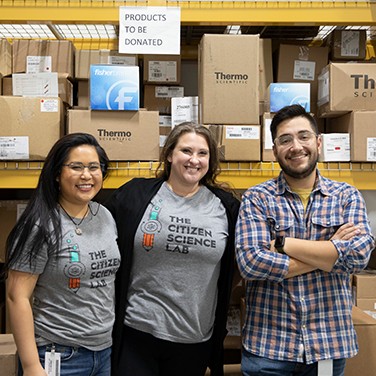Lab Supply Donations Inspire Future Scientists
By Kylie Wolfe
Establishing the perfect partnership can be challenging. But it’s easy to know when you’ve found something meaningful and worthwhile.
The Fisher Scientific channel recently opened a photography and videography studio for the purpose of updating and maintaining product images both online and in print. But many of the products shipped to the studio come in bulk packages that, once opened, aren’t sterile and can’t be returned or resold. Once images are taken and uploaded, consumables like graduated cylinders, plastic beakers, and vials sit on a shelf waiting for a home.
This presented a problem for Danny Baca, manager of photography and videography. Charged with finding a good use for these products, he began his search for a place to donate. And that’s when he found the Citizen Science Lab, a non-profit organization that brings hands-on experiments and out-of-the-box STEM education to the Pittsburgh community.
Equipped for all ages, their offering ranges from weekend workshops and summer camps to on-site visits in classrooms around the region. Students can learn about drones and DNA or robots and reactions, encouraging their next opportunity for discovery.
Unlike other places Baca had contacted, the Citizen Science Lab had a need for anything and everything he had available.
“These are products I wanted to purchase, but I didn’t have the money in my budget,” said Carrianne Floss, the lab’s program manager.
The organization is mostly sustained by donations and grant funding and, though many programs require a small tuition fee, the Citizen Science Lab tries to make science accessible to low-income families through need-based scholarships.
Floss spoke about this specifically, highlighting how much the product donations meant to her and the students who attend.
“I can save money and direct it to more scholarships instead of buying consumables,” she said. “Every time I bring a carload back, people are opening boxes saying ‘Look at this! Look at this!’”
After opening their second location in June of this year, a space that’s four times the size of their original location, buying a lot of new products wasn’t in the cards. Students would often have to share things like beakers, graduated cylinders, and pipettes, and then the staff would wash and reuse them after each program.
Many of these products were glass, but they’ve now been replaced with plastic versions that won’t break when dropped or when transporting them to off-site programs. This is perfect for working with kids and now they each have their own to use during instruction.
Floss also explained that they would label wash bottles with tape and store water in large containers. Now, with right-to-know wash bottles and plastic carboys for water storage, they’re able to better instruct students on safety.
The Citizen Science Lab’s vision is to become the standard model for hands-on science enrichment. Their curriculum focuses less on lecture and more on experimentation. They’re giving students a new perspective and teaching them how to make careers out of activities they love.
“Even if I can’t immediately use something, I know I can create an experiment in the future,” said Floss, excited about the new products and programs that lie ahead.
After donating nearly 40,000 items and counting, Baca is also excited to continue this partnership, hoping to visit their locations and learn more about what they can use and how he can help.
“If I had been exposed to some of these things at a younger age, I might have a whole different passion,” he said. “This is a little thing we can do to help spark students’ interest in science.”
